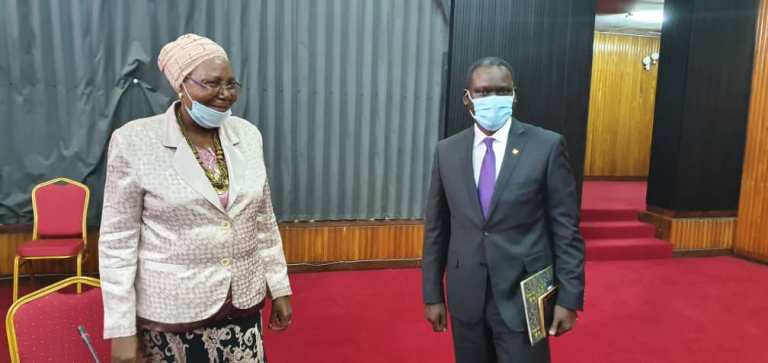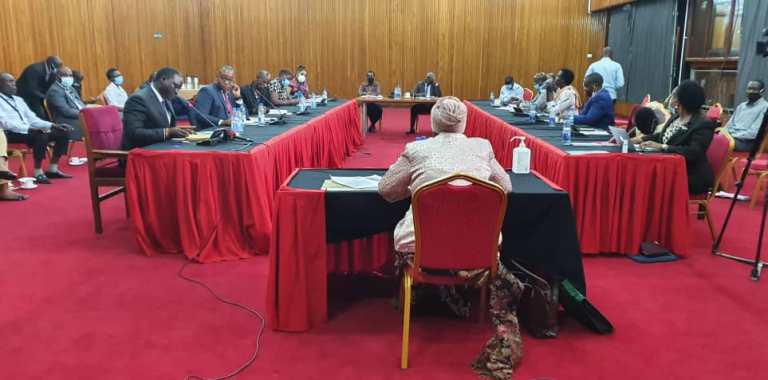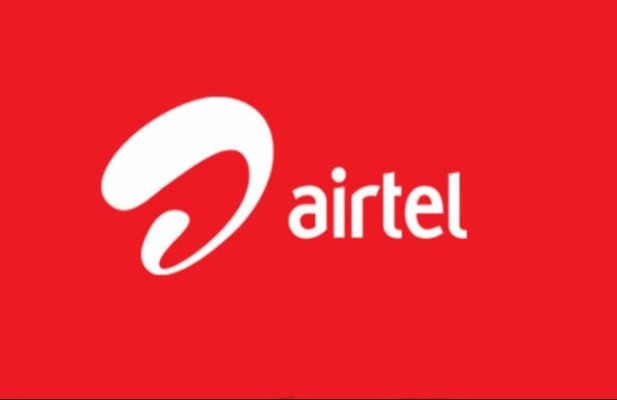NAB Executive in a meeting with Parliament’s Committee on National Economy
The National Association of Broadcasters (NAB), a collective voice of Uganda’s radio, television and online broadcasters, has unveiled a number of proposals to Government on how Uganda’s economy can recover from the toxic effects of COVID-19 pandemic.
NAB led by its Chairman, Kin Kariisa on Friday tabled their proposals to Parliament’s Committee on National Economy that chaired by Dr. Syda N. M. Bbumba.
On economic stimulus, NAB said Government should work hard to increase demand for products by availing cash to the bottom of the pyramid population.

“These consume local products and have a subsistent living, making it harder for them to survive in the times. Using data from Mobile Money companies and information gathered by NIRA through the National ID registration process, these people can be given a weekly or monthly stipend directly to their phones. Also, the money sent directly means it goes into the population directly and is spent hence increasing liquidity and spending power. This will cascade into stimulated demand for goods and services hence taxes, advertising revenue and a better economy,” NAB said in a statement tabled before Bbumba.
The broadcasters also propose that government should lift the threshold for PAYE to Shs600,000 to enable employees at the bottom of the pyramid get some relief to be able to take care of themselves and their families.
According to NAB, Government should “Clear outstanding bills to the media and other suppliers by 30th June 2020. This will help struggling businesses. The media has over 15 billion UGX pending as advertising and communication bills for government and government agencies. If cleared, this would go a long way in keeping the media and other businesses alive.”
Additionally, the price of fuel has a huge impact on the prices of goods and services.
“A big part of this is tax. Government should consider either some fuel subsidies or reducing the tax on fuel and insisting this reflects on the pump prices,” NAB said, adding that government also urgently needs to renegotiate with the energy producing companies and ensure the price of electricity goes down by at least 20%.
“Whereas electricity distribution has increased, most people use it just for lighting. It remains very expensive. A reduction will instantly spur local industry, support farmers in preservation of produce, increase value addition and save the environment,” the statement reads in part.
NAB adds: “ Government has promised to capitalize UDB as an effort to support local industry. This is commendable. We pray for an additional budget that is disbursed directly to SACCOs at village level. Sending this money to SACCOs which are widespread at less than 5% p.a interest would be a shot in the arm for the economy.”
Broadcasters add that the cost of money remains a big hindrance to access to capital.
“The lowering of the CBR rate hasn’t necessarily reflected onto the banks’ lending rate. Much as CBR is now at single digit figures, banks still charge interest rates above 20% p.a. This has put a strain on the business which can’t borrow at these high rates,” NAB’s statement reads in part.
Government has also been urged to promote BUBU.
“We applaud Parliament for passing the Local Content Bill. We believe the country has the capacity to produce most of the goods and services we need. Young industries need to be protected from dumping by allowing for tax waivers for new manufacturers in particular sectors while taxing heavily the cheap imports. It has worked in ceramic tiles and furniture. It can work in agricultural and other products,” NAB said.
Saving Media Industry
For the media, NAB said many are struggling and are finding it difficult to pay license fees.
“We request that we waive license fees for the broadcaster’s payable to UCC for 3 years to keep afloat,” NAB said, adding: “We also request that UBC and Signet waive the signal carriage fees for six months to enable us keep transmitting this important information with less hindrances.”
According to NAB, a lot of advertising is now going to international content distributors such as Google, YouTube, Facebook and others.
“These take away our dollars from small companies as well as the big ones without paying tax. This has eaten into the advertising revenue for media houses further crippling their financial situation. We propose Facebook, YouTube, and other such content distributors to pay content creators. They are doing it in other countries but not here in Uganda. We also need them to be regulated and taxed, which money would help Ugandans in this terrible time,” NAB said.
It added that online communication is becoming the preferred channel of reaching everyone. Most of the vital information on COVID is being spread through social media and WhatsApp.
“However, stuck with a decision of whether to buy food or OTT, many poor citizens will choose the former. In these times of Covid19, we need everyone to access all information unhindered. We pray that the OTT tax be waived for a year to make communication easy,” NAB said, adding: “We also suggest that every government program should have a 2-5% budget component for sensitization and awareness and this should be dedicated towards buying media across all platforms including Newspapers, TV, Radio and online for communicating the new normal.”
NAB says paying taxes is going to be harder for most businesses.
“We pray that URA puts in place policy measures that allow it to forfeiting penalties and interests on tax for a limited time. This will excite defaulters to clear their outstanding bills and enable increased tax collection while reducing the burden to small and Medium businesses,” NAB said.
Where will the money come from?
According to NAB, the budget already had a big travel and per diem for civil servants. There was also a budget for Conferences and seminars.
“Most of these haven’t happened and might not happen till the end of the financial year. This is a big saving that will help avail money for some of these proposals,” NAB said, adding: “Postpone new infrastructure projects for a year and use the money to first stabilize other sectors of economy. It’s a war situation as the president mentioned. Some sacrifices have to be made.”
NAB adds that government should tax the international content distributors such as Google, YouTube, Facebook and fully utilize the grants and donations both local and international.
Media and COVID -19
With the lockdown measures, most people stayed at home. This increased media consumption tremendously. Most people stayed home, watching TV, listening to radios, reading online and other media. However, the industry did not reap from this growth. Instead, it suffered unprecedented loss of revenue.
“The media relies mostly on advertising for business. With the lockdown, most businesses that would advertise, were gravely affected. There was diminished demand as people were confined in their homes and had to ration their savings/incomes to survive the uncertain times. With less sales from the public, most companies halted advertising immediately… The already struggling industry where less than 30% were making profit (even before COVID 19), is now ailing,” NAB said, adding that halting of events, entertainment activities, funeral rights also affected the advertising revenue for most media.
“Note that, the media is a pivotal industry, employing at least 10,000 young people directly and many more indirectly (including newspaper vendors, decoder installers, distributors, engineers among) in its over 306 radios, 39 Television stations, over 50 online outlets and over 7 print media outlets across the country,” NAB noted.
Also, with the lock-down, the commonly used means of transport for staff, were not available. Media houses were forced to hire cars and vans to transport their staff to and from work as well as take journalists to the field.
This increased the costs of doing business exponentially, exacerbating an already bad situation. Some media houses haven’t survived. Some outlets closed temporarily and may never return. Others have been forced to downsize or even furlough staff.
The Media and its role in economic recovery:
With a disease like COVID19 whose therapeutic treatment or vaccine remains elusive, the only medicine known and proven to work thus far is behavioral change.
“This, the media has championed through delivery of accurate, reliable and credible information to the people of Uganda in the languages they understand best. Awareness is enormous, even in the deepest village of the country. This, the members did pro-bono. We applaud Parliament, through the Ministry of ICT and National Guidance for passing a budget to support this initiative, though our request was cut and only 6BN UGX provided with 2Bn released to government through UBC leaving the other over 400 media houses to share 3BN for three months and 1Bn for the Government communications task force. This was very little with many media taking home less than 4M for the three months of the campaign,” NAB said.
NAB noted that the media will take the lead in communicating the new normal post COVID.
“Business is not going to be the same again. We request that all government adopts media across all platforms including Radio, TVs, Newspapers, Online and Out of Home as key component in all their programs and services delivery to ensure a smooth transition to the new normal,” NAB noted.






